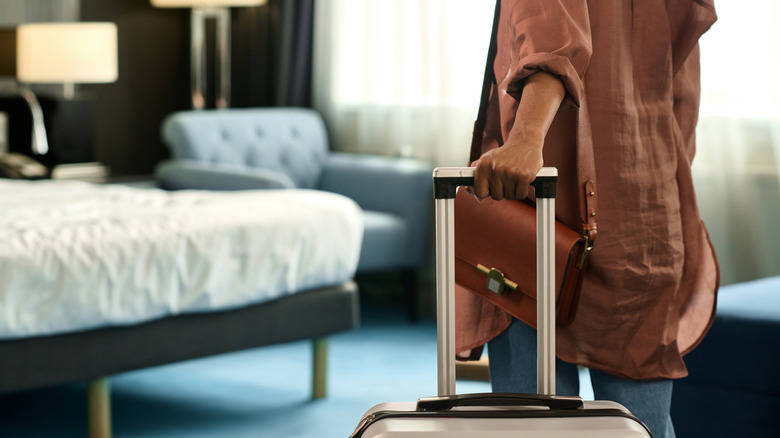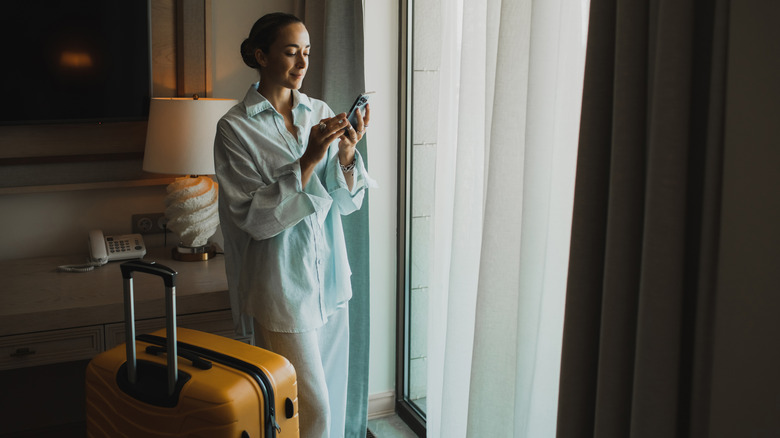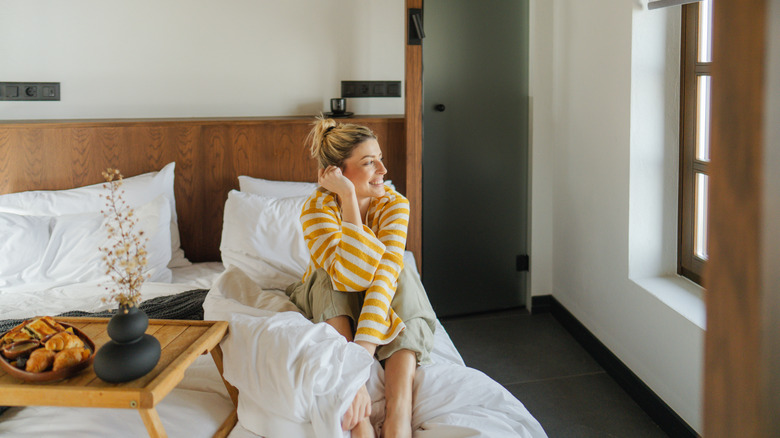The Danger Of Carbon Monoxide Poisoning In Hotels Is Real, Here's The Best Way To Avoid It
Traveling is exciting, fun, and memorable — but it's also not without risk. And while most travelers worry about concerns like potentially losing their luggage, dealing with flight delays or cancellations, or becoming the victim of a common tourist scam, there are plenty of other silent dangers that can come up when you least expect them. However, out of all the threats out there, there's one hidden hazard that's even more concerning, and could prove potentially deadly: carbon monoxide poisoning. A colorless, odorless gas that can cause serious illness or death when people are exposed to it in enclosed spaces, carbon monoxide forms when fuels like gas, oil, or wood don't burn completely (via EPA). In some cases, a carbon monoxide build-up can be the result of faulty heating systems, poorly maintained appliances, or inadequate ventilation.
Unlike most homes, where carbon monoxide detectors are required by law — 48 U.S. states have legislation that enforces this — hotel regulations vary per location, which leaves many travelers unprotected. As reported by Euro News, three American tourists died from carbon monoxide poisoning at an Airbnb in Mexico City in 2023, and similar tragedies have also happened in hotels and motels across the United States (via NIH).
Luckily, however, these incidents can be easily prevented. To learn more about how travelers can protect themselves from a potential tragedy, Explore spoke with Victoria Fricke, owner of the luxury travel agency Vic's Vacations. With years of experience sending clients around the world, Fricke emphasizes that carbon monoxide awareness should be part of every traveler's safety checklist. "I think there's an awareness tourists need to have, but I think that's much different than a fear," she explains. "The reality is carbon monoxide is something that's a lurking danger anywhere — your home, your place of employment, and, yes, your hotel."
How to spot potential risks in your accommodation
Identifying any potential carbon monoxide dangers in a hotel isn't always easy. This, because most issues are typically hiding behind walls or in mechanical equipment that you can't actually see. And, since you can't necessarily check a hotel's safety systems before you arrive, Fricke suggests reading through online reviews for any clues about potential maintenance problems. "General maintenance is the key thing that allows for this to be prevented. While this is hard to spot once on [the] property, I would look for complaints in reviews of poor overall maintenance concerns. Leaking air conditioner units (in excess), pools with trouble regulating heat, and a general lack of maintenance," she advises.
Once you've booked your accommodation, arrived at your destination, and checked in, make sure you check for any early warning signs. "Heavy condensation around appliances could be an initial warning sign visually, along with noticing flames in areas without proper ventilation," Fricke says.
Additionally, you'll also want to pay attention to how you feel. If you start feeling sick with "flu-like symptoms — dizziness, weakness, shortness of breath, confusion, and more" –– carbon monoxide might be the cause. So, whatever you do, don't just wait around to see if you start to feel better. Instead, Fricke suggests quick action: "If you feel off, move locations — get outside or go into another area of the hotel to see if those feelings go away."
The easiest solution to protect yourself
Although you might think that simply booking a luxury five-star accommodation means you're sure to be safe, that's not always the case. "The harsh reality is it can happen anywhere. A nice hotel and a hole in the wall," Fricke warns. And, considering that many hotels don't have detectors — especially abroad — waiting and hoping for the best just isn't a good strategy.
Instead, Fricke has a simple solution: "Absolutely pack your own. For $35 or less, you have a guarantee that you're in the clear." With plenty of affordable portable options available online — like this plug-in carbon monoxide alarm from Kidde — buying and traveling with your own alarm is a small investment that'll give you the protection (and peace of mind) that many hotels don't offer.
Better yet, these detectors barely take up any room in your luggage, which means you won't have to sacrifice precious space or get hit with any annoying overweight fees for the sake of bringing one along just in case. While you definitely don't want to spend too much time thinking about the worst-case scenario, having this simple device is more than just a precaution. Per Fick, it could even "save your life and those in rooms around yours."


